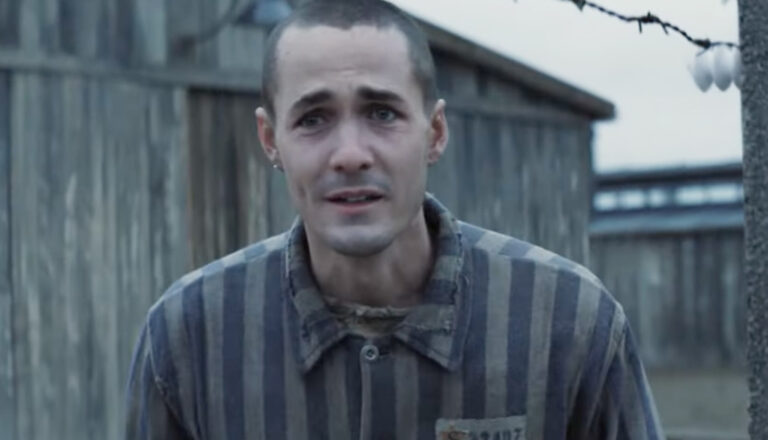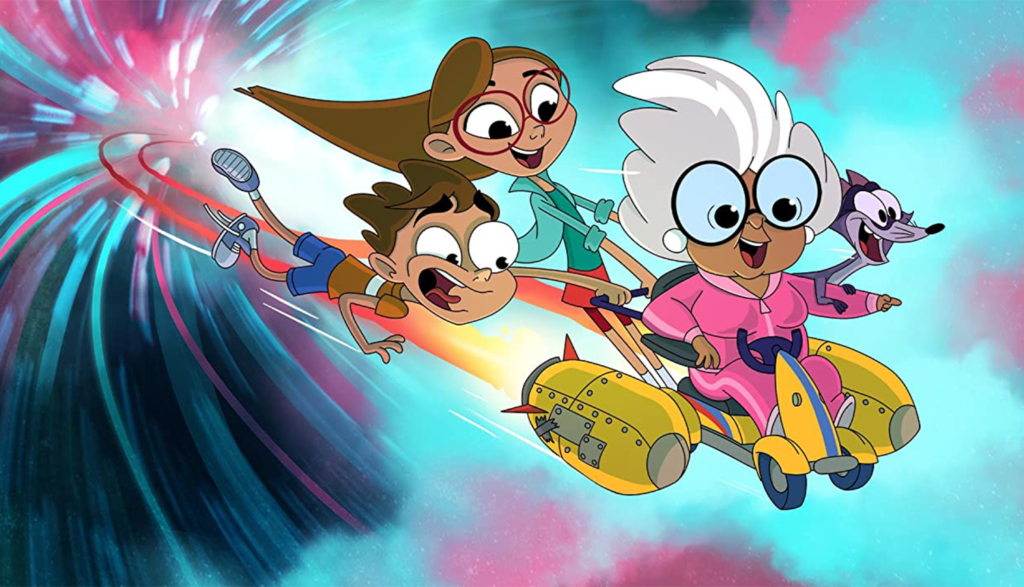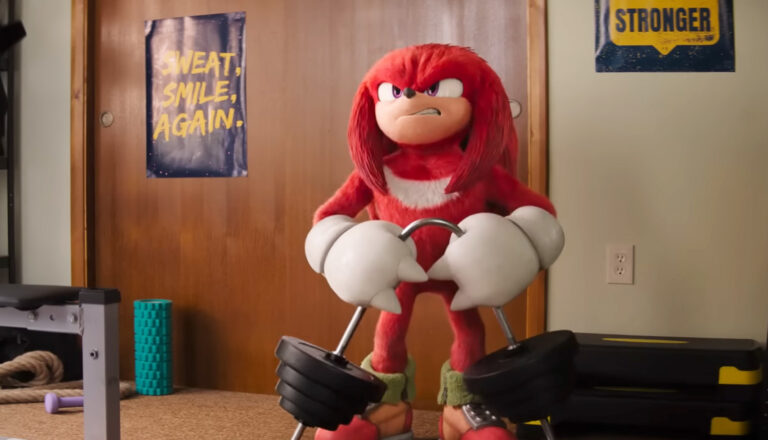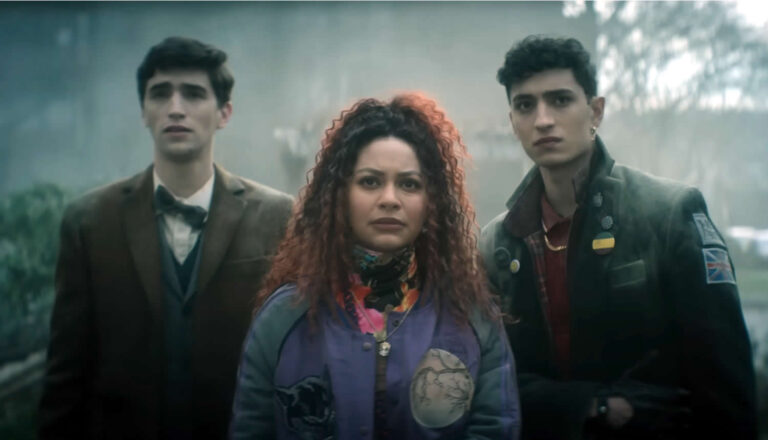
The Tattooist of Auschwitz
The Tattooist of Auschwitz is a little like its titular character. It’s painful. It gets under your skin. And it just might leave a mark.

If you have one laying around, time machines are pretty useful. You can zip back a week and study for that math test a little more thoroughly. You can go back 40 years and invest in Apple. You could go way back in time and bury a Starbucks coffee cup in the Stonehenge construction site and really mess with present/future scientists.
Or you could learn, first-hand, about the joys of property rights and the evils of progressive agendas.
This is the way that Grandma Gabby prefers to use her time machine—taking her two grandkids and her pet (but rather feral) raccoon along for the ride.
Emily and Ethan Tuttle didn’t know their grandmother had a time machine when she first moved into the Tuttle homestead, naturally. Oh, they could see Grandma was a little off: The raccoon was proof enough of that. But they didn’t see just how unusual she was for a few … hours. Perhaps it’s because Emily and Ethan were too preoccupied with their favorite activities at first (science and gummy bears, respectively) to notice.
But soon all three (plus the raccoon) are galivanting through space and time, from visiting with Ben Franklin (and talking with him about what it means to be an entrepreneur) to taking part in an earthworm war (to learn about the golden rule) to battling space pirates (as they discover the importance of free trade).
And as they do, the twins must continually outwit their mortal enemy, Karinne, whose sole purpose in life seems to be to give the Tuttles headaches.
Perhaps she’s just jealous because she doesn’t have a time machine. Or maybe she’s simply fallen prey to the liberal agenda.
Tuttle Twins has an agenda of its own, of course, and it makes no secret of what it is: counterbalancing what its creators see as the left-leaning propaganda found in schools, city halls and even children’s programming.
The series is based on a popular collection of kids’ books by Connor Boyack (president of Utah’s free market think-tank Libertas Institute) also titled The Tuttle Twins. The book series’ website asks visitors, “Our books recognize that the world is full of companies, people, and politicians who want to expose your children to ideas you do not support. This includes school teachers who see their job as ‘activism’ to spread leftist ideas and encourage children to think like they do.”
The animated television show—streaming on the Angel Studios app, which also hosts The Chosen and which you can download for free—seems to take a less confrontational approach than, at least, the books’ website. While its serious mission still forms the show’s DNA, this cartoon aims as much for the funny bone as it does the frontal lobe.
Tonally, Tuttle Twins feels like a cross between Gravity Falls and The Magic Schoolbus. Created by Daniel Harmon, the series is filled with funny lines and meta asides, and it barrels along at a breathless pace. It knows what its primary audience likes, and it knows how to deliver.
As for its secondary audience—conservative parents—well, it knows them pretty well, too. To a point.
Despite its presence on Angel, Tuttle Twins is not a faith-based show. It contains very little faith content at all, actually—though the twins do visit Gandhi, who gives them an interfaith lecture about the Golden Rule (and praises the principles of nonviolence). But it does undergird other conservative values that many Christian families embrace alongside their faith: property rights, limited government, free market trade, etc. Those who bemoan the “liberal agenda” will find a witty ally in Tuttle Twins.
But the show comes with a few cautionary caveats for even those like-minded parents.
Tuttle Twins’ jokes tend to lean toward the immature, with gags predicated on everything from flatulence to body odor. Neither Emily nor Ethan always act as role models for viewers, either: Ethan’s obsession with sugar runs through most every episode, and even the usually upright Emily can stray. (“I love morally ambiguous Emily!” Ethan shouts when his sister seeks revenge against her enemies.) While The Tuttle Twins books were written by a homeschool parent himself, a bit of what we see in the show actually echo what some homeschool parents are trying to avoid.
Still, even with those content issues, Tuttle Twins is a rare form of activism and entertainment that truly does entertain as it teaches a defined, conservative worldview. And for like-minded parents who can navigate its occasional rabbit trails to the bathroom, this show can be a fun family watch.
Emily and Ethan set up a lemonade stand to fund their trip to science camp. But things go awry when Karinne—as the head of a neighborhood kids’ committee—says she gets her lemonade for free: It’s in the neighborhood bylaws as of last night, thanks to an “emergency meeting” she held (with one other, terrified, kid). The Tuttles feel they have no choice to accept the sad reality of this unjust law until their newly arrived grandmother reveals that she owns a time machine. She quickly zips them back to meet a prominent French economist in 1848 and a put-upon rancher in the Old West.
Grandma Gabby’s time machine is powered by “knowledge juice,” which requires Ethan and Emily to take a pop quiz over what they learned before they can get back home. What did they learn? That laws (according to the economist, Frédéric Bastiat) should protect our “God-given rights and our natural rights.” And those laws should also protect our life, liberty and property. But when they go to the Old West, they discover the rancher’s cattle are being rustled by a government tax collector (who aims to give her cows to others) and another cow-based charity who needs to “collect some cows for my cow-selling business.” These rustlers are eventually revealed as real thieving rustlers, which the town’s sheriff deals with.
They also learn, however, that Frédéric Bastiat has a body odor problem (a joke repeated often). Someone suggests that “bidet” is French for “salad bowl.” When Emily wonders about what’s making a strange noise inside the house, Ethan thinks she’s talking about his “IBS” (presumably irritable bowel syndrome).
Grandma Gabby orders her “usual root beer,” with a wink. Ethan discovers she’s lying, thinking the beverage is ginger ale. (Grandma’s reaction suggests that it’s perhaps something stronger than that.) Ethan pours loads of sugar into some lemonade, exponentially increasing its calorie content. Grandma Gabby’s feral raccoon shows its feral, threatening side.
Emily and Ethan head off to science camp, along with several other kids from the neighborhood. Emily’s particularly excited about developing her worm-based experiments, where she’ll feed worms different sorts of food, examine their excretions and “ultimately solve world hunger.” But Emily’s ambitions—and the camp itself—quickly go off the rails as the camp’s two factions start participating in ever-escalating pranks.
The conflict leaks into the worm world, where a worm war leads to lots of potential for injury and death and for casualties to be planted six feet under. “And not in the fun worm way,” we’re told. One worm—George Wormington—loses part of his hindquarters (called a worm rump here), which becomes yet another contentious issue for the wrigglers (and a running gag besides).
Emily and Ethan are whisked into the past to visit Gandhi, who announces that he’s currently fasting. “The pain of hunger is nothing compared to the pain of war and oppression.” When the twins ask him about revenge, Gandhi quotes himself: “An eye for an eye can make the whole world blind.” He says he learned his philosophy of nonviolence from following the “principles of Hinduism and the teachings of Jesus,” adding that all major religions have some sort of doctrine that would be represented by the Golden Rule. We also hear an ancient Arab proverb: “Whoever strikes the second blow starts the fight.”
We see lots of chaotic, mean-spirited pranks played on students at science camp. (A kid gets covered in slime in the shower, for instance.) One kid is repeatedly dropped (and when the droppers agree to drop him more softly, he says that it doesn’t injure his spine quite as much). We hear a reference to a laxative. Gandhi lets slip that Grandma thinks one twin is “cuter than the other.” (It’s not specified which one.) Grandma Gabby’s raccoon fights with a large squirrel—squabbles that descend into slap fights. When someone’s told about turning the other cheek, he mistakes it as referring to his rear—and what to do when one side falls asleep.


Paul Asay has been part of the Plugged In staff since 2007, watching and reviewing roughly 15 quintillion movies and television shows. He’s written for a number of other publications, too, including Time, The Washington Post and Christianity Today. The author of several books, Paul loves to find spirituality in unexpected places, including popular entertainment, and he loves all things superhero. His vices include James Bond films, Mountain Dew and terrible B-grade movies. He’s married, has two children and a neurotic dog, runs marathons on occasion and hopes to someday own his own tuxedo. Feel free to follow him on Twitter @AsayPaul.

The Tattooist of Auschwitz is a little like its titular character. It’s painful. It gets under your skin. And it just might leave a mark.

The Sonic spinoff blends explosive adventure and road-trip-buddy-comedy into a fun romp for both kids and diehard fans.

Dead Boy Detectives targets teens in style and story. But it comes with very adult, problematic content.